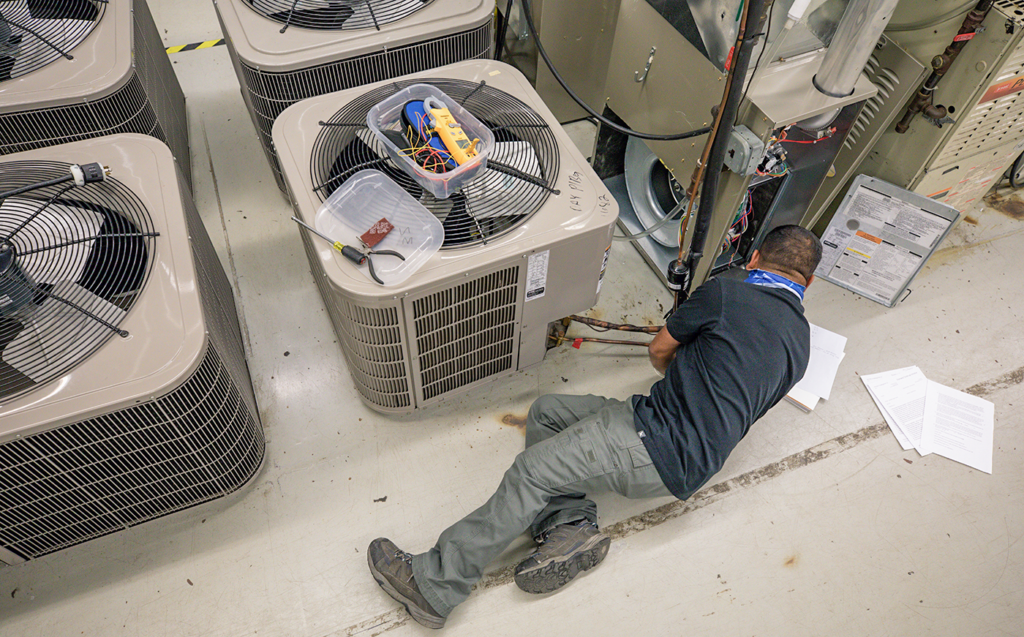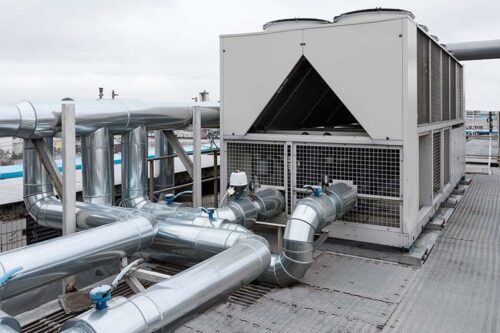Quality Furnace Installation Services To Keep Your Home Warm And Efficient
Quality Furnace Installation Services To Keep Your Home Warm And Efficient
Blog Article
Your Overview to Choosing the Right HVAC System for Your Demands
Picking an ideal cooling and heating system is a crucial decision that can substantially impact comfort and energy efficiency in your home. Different elements have to be considered, including the size of your home, local climate problems, and certain heating or cooling needs. Additionally, comprehending the different sorts of systems readily available and their power rankings can help direct your selection. By evaluating these components thoroughly, you can prevent usual pitfalls. What crucial factors to consider should you prioritize to guarantee your investment fulfills both instant and long-term requirements?
Comprehending Cooling And Heating System Kind
When selecting a cooling and heating system, it is important to understand the different kinds readily available to satisfy your particular requirements. The primary classifications of HVAC systems consist of central air conditioning systems, ductless mini-split systems, heatpump, and furnace systems.
Central air systems are developed to cool down multiple areas using ductwork to disperse conditioned air. They are optimal for bigger homes needing regular temperature level control. Ductless mini-split systems, on the various other hand, provide adaptability and efficiency, as they enable zoning capacities, making it possible for private area temperature law without the requirement for ductwork.
Heat pumps run by moving heat instead than generating it, making them an energy-efficient choice for both home heating and cooling. Conversely, heating system systems utilize burning to create warmth, utilizing either gas, electrical power, or oil.
Each system has distinctive benefits and considerations, including installment needs, maintenance, and total prices. Comprehending these kinds will certainly help house owners make educated decisions based upon their specific demands, climate, and spending plan restrictions, ultimately making certain optimum comfort and effectiveness.
Evaluating Power Efficiency
Energy efficiency is an important aspect in the option of a Cooling and heating system, as it straight influences both utility costs and environmental sustainability. The Seasonal Power Efficiency Proportion (SEER) and the Heating Seasonal Efficiency Variable (HSPF) are crucial indications for air conditioning systems, representing their efficiency over a regular air conditioning and heating period, respectively.
Additionally, try to find systems that have actually made the ENERGY celebrity tag. This qualification signifies that the devices satisfies strict power effectiveness guidelines set by the U.S. Epa. Consider the system's variable-speed technology, which permits a lot more efficient operation by readjusting the outcome to match need, even more enhancing power savings.
In addition, proper insulation and air duct securing can dramatically affect the system's overall efficiency. In summary, picking an energy-efficient HVAC system not just decreases your energy bills yet additionally adds to a much more lasting setting, making it an essential factor to consider in your acquiring process.
Assessing System Size
Selecting the appropriate size for a cooling and heating system is essential to making certain optimum performance and efficiency. A small system may struggle to preserve preferred temperatures, leading to enhanced wear and tear, higher power consumption, and reduced convenience. Alternatively, an extra-large system can bring about rapid biking, which not only causes inefficiencies however likewise affects moisture control and air top quality.
To examine the excellent sizing, it is necessary to conduct a tons estimation, which thinks about variables such as the square video of the area, insulation levels, home window sizes, and regional environment conditions - furnace repair. This computation assists determine the British Thermal Devices (BTU) needed for heating and cooling. In addition, it is important to account for certain demands, such as the variety of passengers and the presence of heat-generating home appliances

Setup Costs and Budget Plan
A comprehensive understanding of visit this page setup expenses is essential for companies and home owners considering a brand-new HVAC system. The overall expenditure of installation can differ commonly based on several aspects, including the kind of system, the complexity of installation, and the area of the home. Generally, installment expenses can vary from $3,000 to $10,000, relying on the system's dimension and performance.
When budgeting for an a/c system, it is vital to consider not just the preliminary setup expenses yet also any extra costs that may develop, such as ductwork alterations, electrical upgrades, or permits. In addition, it is recommended to get numerous quotes from qualified cooling and heating contractors to make sure affordable rates.
House owners need to also consider the prospective long-lasting financial savings related to energy-efficient systems. While the in advance prices might be higher, energy-efficient models can lead to considerable financial savings on energy bills gradually.

Upkeep and Longevity Factors To Consider

Appropriate maintenance includes routine assessments, filter substitutes, and cleansing of coils and air ducts (furnace installation). Overlooking these jobs can result in reduced effectiveness, enhanced energy prices, and early system failing. Home owners should likewise think about the availability of service agreements, which often supply scheduled maintenance and concern service, making certain that the system stays in peak problem
Durability varies by system kind; as an example, well-maintained central air systems can last 15 to two decades, while heatpump may have a life expectancy of 10 to 15 years. Choosing a system with a strong credibility for reliability, in addition to buying normal upkeep, can substantially enhance the system's durability. Additionally, choosing higher-efficiency versions may result in lasting savings on energy costs, stabilizing the preliminary financial investment in time.
Final Thought
Finally, selecting a proper HVAC system requires cautious consideration of various factors, including system kinds, power performance, and size. Assessing installation costs and long-term maintenance requirements is necessary for guaranteeing optimum efficiency and cost-effectiveness. Engaging with cooling and heating professionals can offer beneficial understandings and customized recommendations that align with details heating and cooling down needs. Ultimately, an educated choice will certainly boost comfort and performance in residential settings while maximizing power cost savings.
Picking an appropriate Cooling and heating system is a vital choice you can look here that can considerably impact convenience and energy effectiveness in your home.Energy effectiveness is a critical element in the option of an A/c system, as it directly affects both utility prices and environmental sustainability. The Seasonal Power Efficiency Ratio (SEER) and the Heating Seasonal Performance Variable (HSPF) are important indicators for air conditioning systems, representing their effectiveness over a typical air conditioning and home heating season, specifically. Choosing a system with a solid online reputation for reliability, along with investing in normal upkeep, can significantly improve the system's longevity.In final thought, choosing an ideal Heating and cooling system requires cautious factor to consider of various elements, including system kinds, power effectiveness, and dimension.
Report this page